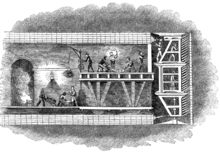
Back সুড়ঙ্গ খননকারী ঢাল Bengali/Bangla Escut tunelador Catalan Schildvortrieb German Escudo tunelador Spanish سپر تونل Persian シールドトンネル Japanese Geboorde tunnel Dutch Tuneladora escudo Portuguese Проходческий щит Russian Прохідницький щит Ukrainian


A tunnelling shield is a protective structure used during the excavation of large, human-made tunnels. When excavating through ground that is soft, liquid, or otherwise unstable, there is a potential health and safety hazard to workers and the project itself from falling materials or a cave-in. A tunnelling shield can be used as a temporary support structure. It is usually in place for the short-term from when the tunnel section is excavated until it can be lined with a permanent support structure. The permanent structure may be made up of, depending on the period, bricks, concrete, cast iron, or steel. Although modern shields are commonly cylindrical, the first "shield", designed by Marc Isambard Brunel, was actually a large, rectangular, scaffold-like iron structure with three levels and twelve sections per level, with a solid load-bearing top surface. The structure protected the men from cave-ins as they laboured within it, digging the tunnel out in front of the shield.